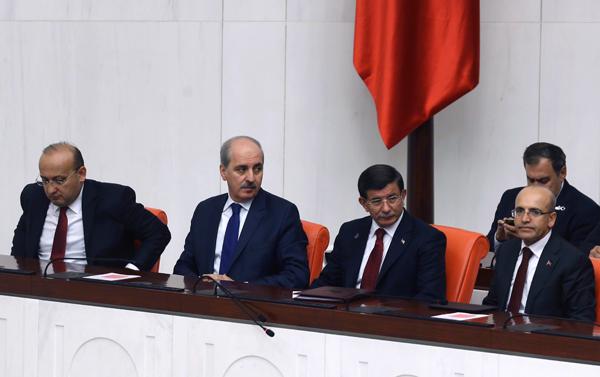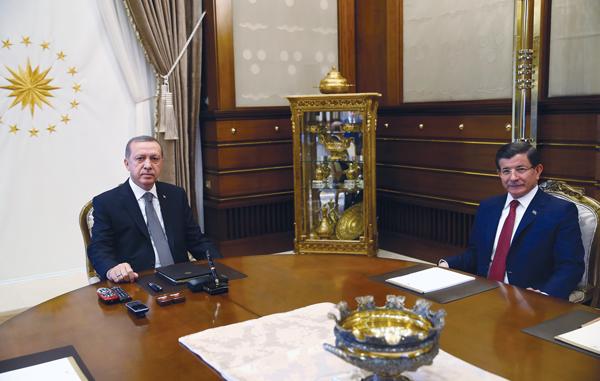You are here
For Turkey's new economy chief, litmus test will be reform, central bank
By Reuters - Nov 28,2015 - Last updated at Nov 28,2015

From left to right: Members of new Turkish Cabinet Deputy Prime Minister Yalcin Akdogan, Deputy Prime Minister Numar Kurtulmus, Turkish Prime Minister Ahmet Davutoglu and Deputy Prime Minister Mehmet Simsek, attend a session of the Turkish parliament in Ankara last week (AFP photo)
ISTANBUL — As a onetime Wall Street banker and former finance minister, Turkey's new economy tsar Mehmet Simsek is widely seen as a proponent of sound economics and fiscal discipline.
But the real test of his credibility is yet to come, as investors wait to see whether he will be able to drive through tough structural reforms and appoint an independent central bank chief come April.
Prime Minister Ahmet Davutoglu on Tuesday named Simsek to his new Cabinet as deputy prime minister in charge of the economy, a position previously held by Ali Babacan, who was left out of the new government.
The inclusion of Simsek, who previously worked at UBS on Wall Street and Merrill Lynch in London, offers some reassurance to investors concerned the Cabinet is stacked with allies of President Recep Tayyip Erdogan, including his own son-in-law.
"In Babacan's absence, the government will need to work harder to build credibility. The new government programme and the structural reform programme should be the first tests for the new Cabinet," said Yarkin Cebeci, an economist at JPMorgan in Istanbul.
Simsek takes over the job at a time when economic and monetary policy appear to bend more and more to Erdogan's will. The founder of the ruling AK Party, Erdogan has railed against high interest rates, raising concern among foreign investors the central bank has lost independence.
Investors see the AKP's return to single-party rule after its sweeping November 1 election victory as offering an opportunity to follow through with long-neglected economic reforms. But success will largely depend on whether Simsek and others will be able to resist Erdogan's push for populist policies.
"Simsek is the key anchorman now for economic reforms — let's see if he has the political capital to drive these forward," said Timothy Ash, a strategist at investment bank Nomura.
Key reforms should include labour reform to increase labour productivity and support industries that will help produce more value added export goods.
Simsek will oversee the Treasury, the central bank and coordination between economy related institutions.
Pressing problems
Analysts say the most pressing problems include the need to slow a rapid increase in labour costs and scale back private sector debt. Both have hampered growth and made Turkey's balance sheet one of the most fragile in emerging markets.
"Arguably the most rapid progress on this front can come from a tighter central bank framework, and hence the choice of central bank governor in April will be watched keenly by the markets," UBS Strategist Manik Narain told Reuters.
Central bank governor, Erdem Basci, ends his five-year term in April. Although he could be reappointed, Basci was a school friend of Babacan and their fates are seen as closely linked.
Babacan both proposed Basci as central bank governor and was seen as his main defender in the Cabinet when Erdogan and ministers criticised monetary policy.
"I also wonder if Babacan's exclusion also means the end for his close ally, Basci," Nomura's Ash said, adding that Basci appeared unlikely to be given another term.
In addition to Basci, three deputy central bank governors will see their terms end by June. Simsek will also need to appoint a new Treasury undersecretary. The top job at the Treasury has remained open for 15 months, since the former undersecretary went to the International Monetary Fund (IMF).
"This is a clearly an Erdogan-made cabinet, and I see Simsek's appointment as part of calming the markets," said Ugur Gurses, a former central banker and a columnist at Hurriyet newspaper.
"His influence on outlining a detailed and do-able reform plan and appointments of the new Treasury undersecretary and the central bank governor will be the major challenges he will face," he added.
Separately, Davutoglu said on Wednesday that Turkey's new government will aim to bring inflation down to single digits and maintain central bank independence, laying out a market friendly programme designed to woo back investors.
Monetary policy will emphasise financial and price stability, while supporting growth and employment at the same time, Davutoglu said in his speech to parliament.
"We believe that it will be crucial for the government to press ahead with a coherent and well-prioritised reform package," Citigroup analysts said in a note to clients last week, before Davutoglu announced his programme.
Industrial policy
The government will focus on macroeconomic stability, and microeconomic and sectoral reforms, he said. It will try to accelerate industrialisation and bolster manufacturing output.
He also pledged to address Turkey's yawning current account deficit, a constant source of concern for investors.
Related Articles
Turkish Central Bank Governor Erdem Basci, a technocrat reluctantly thrust into a standoff with President Recep Tayyip Erdogan, appears to believe he will eventually ride out the storm.
ANKARA — Turkey's new Cabinet will bear the firm stamp of President Recep Tayyip Erdogan with a slew of loyal advisors set for ministe
In a farewell speech to supporters of his AK Party, Turkish President-elect Recep Tayyip Erdogan said its mission to reshape the nation would go on after he left party politics and took office as head of state.

















